Employee Turnover in Tourism New Zealand (Cleaning): A Review
VerifiedAdded on 2023/06/12
|11
|3361
|395
Literature Review
AI Summary
This literature review proposal investigates employee turnover within New Zealand's tourism cleaning industry, specifically focusing on Clean Corp Ltd. The introduction outlines the research questions and objectives, highlighting the increasing demands and labor shortages within the sector. The literature review analyzes five selected articles to identify key factors influencing employee turnover, including the importance of soft-skill development and the inadequacy of current training programs. It emphasizes the necessity of a structured and quality training system to address the growing demands of the NZ tourism sector and improve employee engagement. The review concludes with recommendations for Clean Corp Ltd to enhance its training framework, aiming to reduce turnover and improve overall service quality in the face of rapid industry growth.
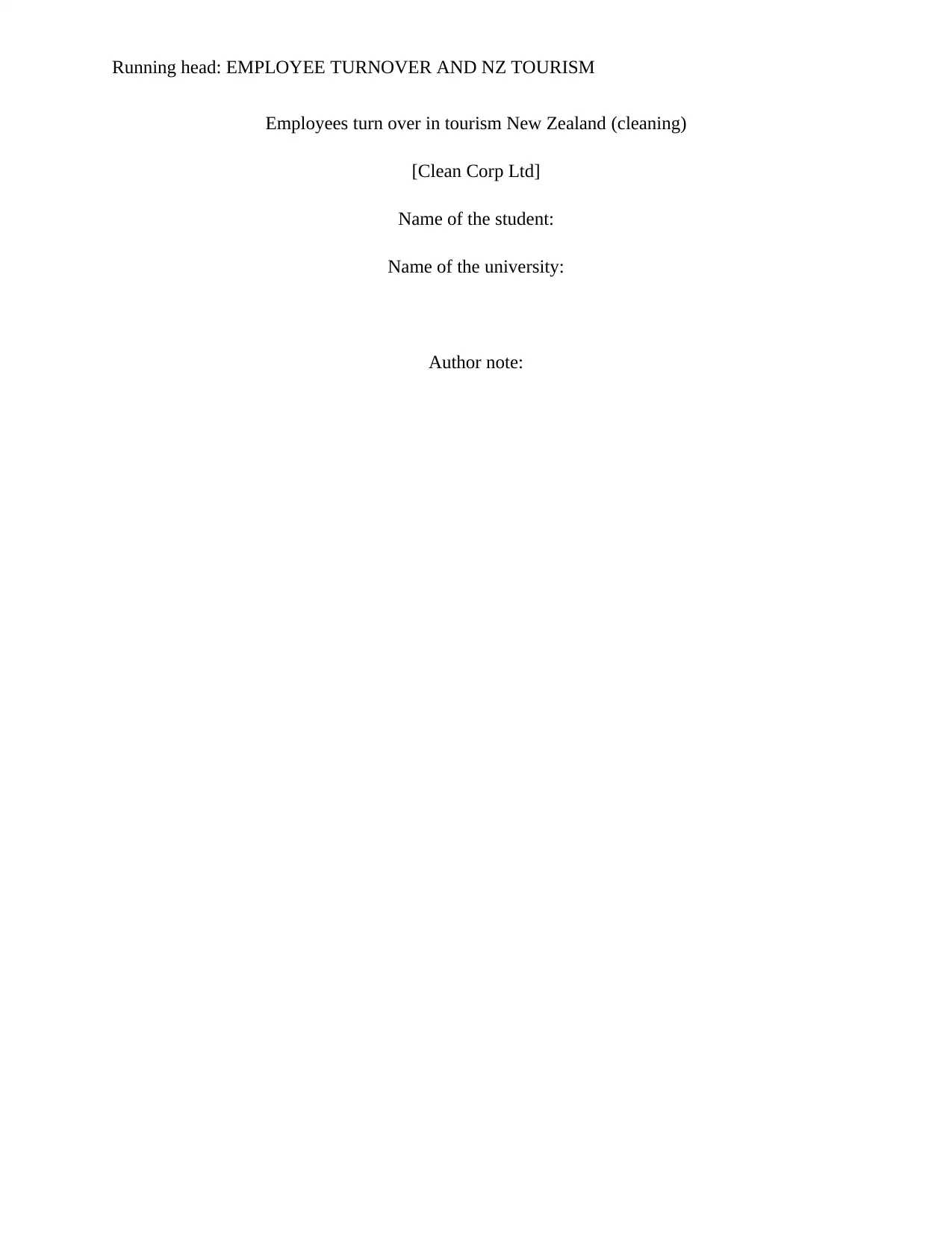
Running head: EMPLOYEE TURNOVER AND NZ TOURISM
Employees turn over in tourism New Zealand (cleaning)
[Clean Corp Ltd]
Name of the student:
Name of the university:
Author note:
Employees turn over in tourism New Zealand (cleaning)
[Clean Corp Ltd]
Name of the student:
Name of the university:
Author note:
Paraphrase This Document
Need a fresh take? Get an instant paraphrase of this document with our AI Paraphraser
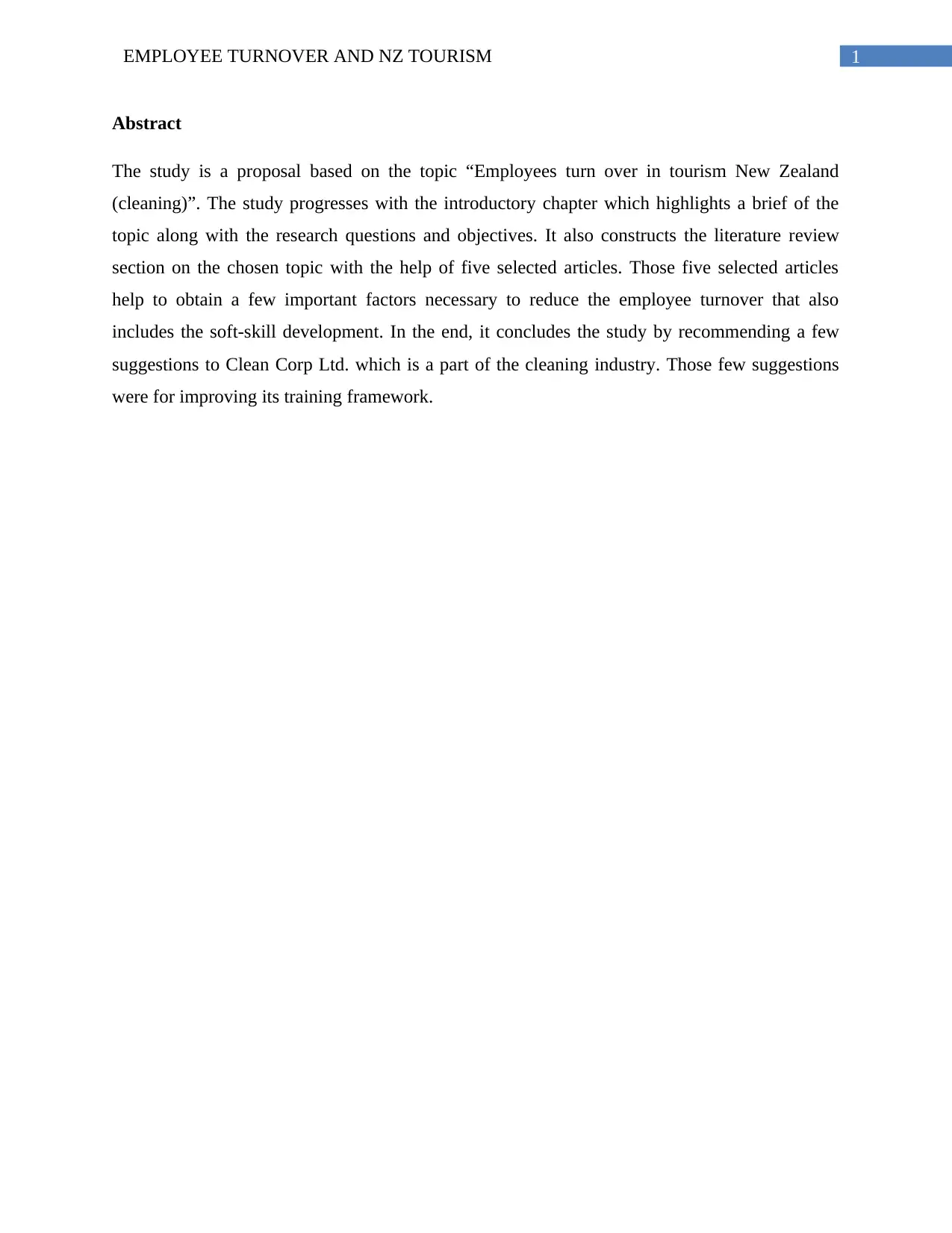
1EMPLOYEE TURNOVER AND NZ TOURISM
Abstract
The study is a proposal based on the topic “Employees turn over in tourism New Zealand
(cleaning)”. The study progresses with the introductory chapter which highlights a brief of the
topic along with the research questions and objectives. It also constructs the literature review
section on the chosen topic with the help of five selected articles. Those five selected articles
help to obtain a few important factors necessary to reduce the employee turnover that also
includes the soft-skill development. In the end, it concludes the study by recommending a few
suggestions to Clean Corp Ltd. which is a part of the cleaning industry. Those few suggestions
were for improving its training framework.
Abstract
The study is a proposal based on the topic “Employees turn over in tourism New Zealand
(cleaning)”. The study progresses with the introductory chapter which highlights a brief of the
topic along with the research questions and objectives. It also constructs the literature review
section on the chosen topic with the help of five selected articles. Those five selected articles
help to obtain a few important factors necessary to reduce the employee turnover that also
includes the soft-skill development. In the end, it concludes the study by recommending a few
suggestions to Clean Corp Ltd. which is a part of the cleaning industry. Those few suggestions
were for improving its training framework.
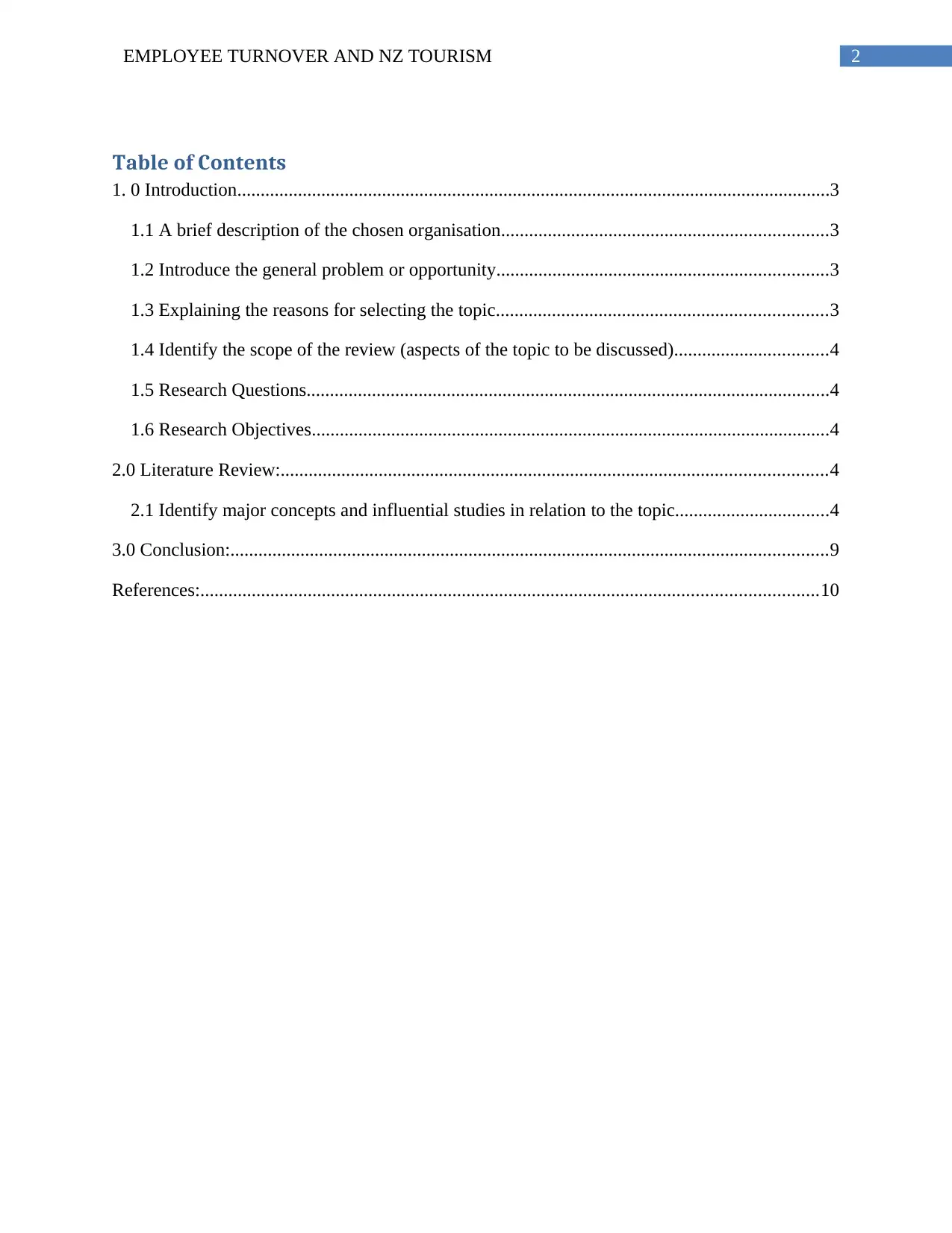
2EMPLOYEE TURNOVER AND NZ TOURISM
Table of Contents
1. 0 Introduction...............................................................................................................................3
1.1 A brief description of the chosen organisation......................................................................3
1.2 Introduce the general problem or opportunity.......................................................................3
1.3 Explaining the reasons for selecting the topic.......................................................................3
1.4 Identify the scope of the review (aspects of the topic to be discussed).................................4
1.5 Research Questions................................................................................................................4
1.6 Research Objectives...............................................................................................................4
2.0 Literature Review:.....................................................................................................................4
2.1 Identify major concepts and influential studies in relation to the topic.................................4
3.0 Conclusion:................................................................................................................................9
References:....................................................................................................................................10
Table of Contents
1. 0 Introduction...............................................................................................................................3
1.1 A brief description of the chosen organisation......................................................................3
1.2 Introduce the general problem or opportunity.......................................................................3
1.3 Explaining the reasons for selecting the topic.......................................................................3
1.4 Identify the scope of the review (aspects of the topic to be discussed).................................4
1.5 Research Questions................................................................................................................4
1.6 Research Objectives...............................................................................................................4
2.0 Literature Review:.....................................................................................................................4
2.1 Identify major concepts and influential studies in relation to the topic.................................4
3.0 Conclusion:................................................................................................................................9
References:....................................................................................................................................10
⊘ This is a preview!⊘
Do you want full access?
Subscribe today to unlock all pages.

Trusted by 1+ million students worldwide
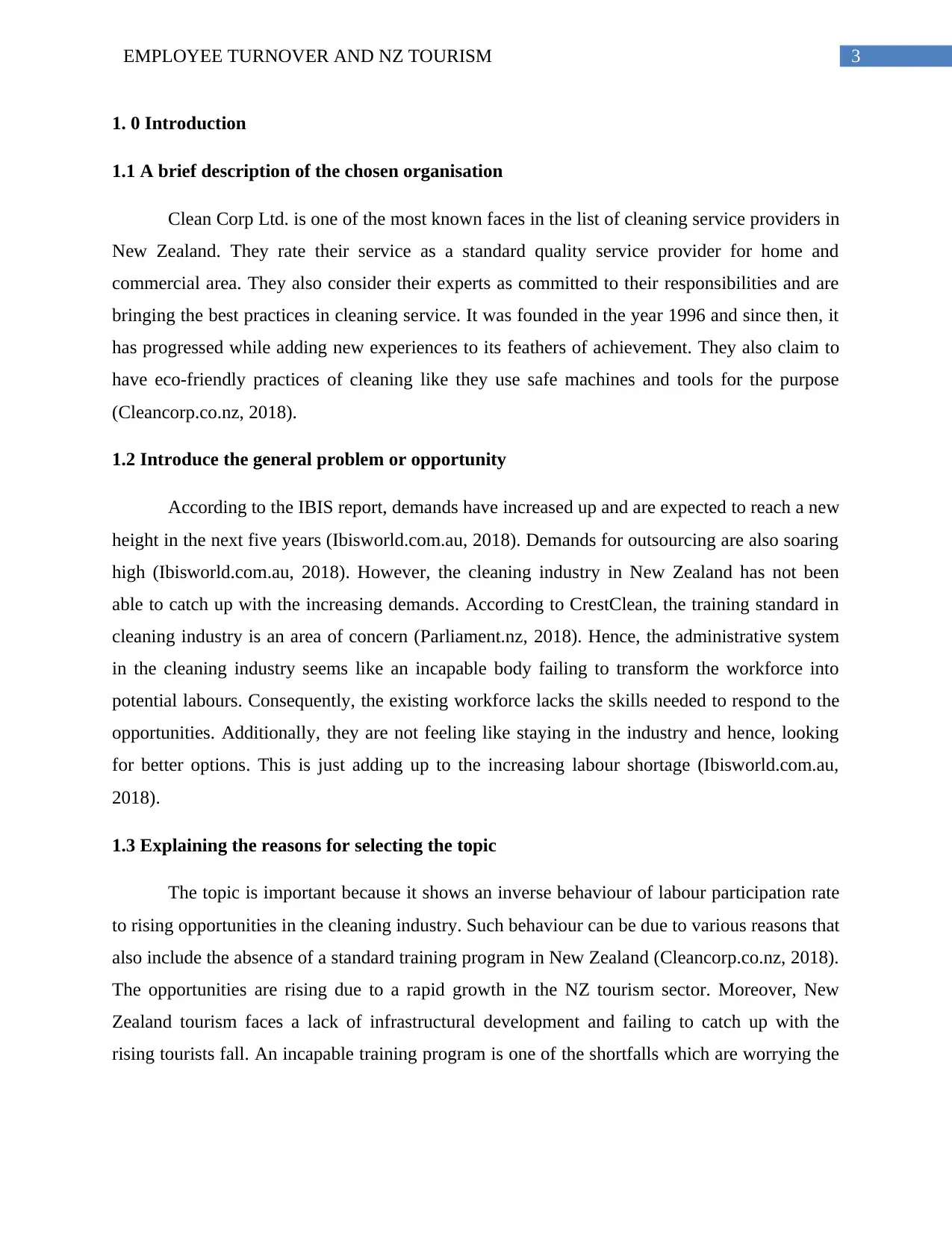
3EMPLOYEE TURNOVER AND NZ TOURISM
1. 0 Introduction
1.1 A brief description of the chosen organisation
Clean Corp Ltd. is one of the most known faces in the list of cleaning service providers in
New Zealand. They rate their service as a standard quality service provider for home and
commercial area. They also consider their experts as committed to their responsibilities and are
bringing the best practices in cleaning service. It was founded in the year 1996 and since then, it
has progressed while adding new experiences to its feathers of achievement. They also claim to
have eco-friendly practices of cleaning like they use safe machines and tools for the purpose
(Cleancorp.co.nz, 2018).
1.2 Introduce the general problem or opportunity
According to the IBIS report, demands have increased up and are expected to reach a new
height in the next five years (Ibisworld.com.au, 2018). Demands for outsourcing are also soaring
high (Ibisworld.com.au, 2018). However, the cleaning industry in New Zealand has not been
able to catch up with the increasing demands. According to CrestClean, the training standard in
cleaning industry is an area of concern (Parliament.nz, 2018). Hence, the administrative system
in the cleaning industry seems like an incapable body failing to transform the workforce into
potential labours. Consequently, the existing workforce lacks the skills needed to respond to the
opportunities. Additionally, they are not feeling like staying in the industry and hence, looking
for better options. This is just adding up to the increasing labour shortage (Ibisworld.com.au,
2018).
1.3 Explaining the reasons for selecting the topic
The topic is important because it shows an inverse behaviour of labour participation rate
to rising opportunities in the cleaning industry. Such behaviour can be due to various reasons that
also include the absence of a standard training program in New Zealand (Cleancorp.co.nz, 2018).
The opportunities are rising due to a rapid growth in the NZ tourism sector. Moreover, New
Zealand tourism faces a lack of infrastructural development and failing to catch up with the
rising tourists fall. An incapable training program is one of the shortfalls which are worrying the
1. 0 Introduction
1.1 A brief description of the chosen organisation
Clean Corp Ltd. is one of the most known faces in the list of cleaning service providers in
New Zealand. They rate their service as a standard quality service provider for home and
commercial area. They also consider their experts as committed to their responsibilities and are
bringing the best practices in cleaning service. It was founded in the year 1996 and since then, it
has progressed while adding new experiences to its feathers of achievement. They also claim to
have eco-friendly practices of cleaning like they use safe machines and tools for the purpose
(Cleancorp.co.nz, 2018).
1.2 Introduce the general problem or opportunity
According to the IBIS report, demands have increased up and are expected to reach a new
height in the next five years (Ibisworld.com.au, 2018). Demands for outsourcing are also soaring
high (Ibisworld.com.au, 2018). However, the cleaning industry in New Zealand has not been
able to catch up with the increasing demands. According to CrestClean, the training standard in
cleaning industry is an area of concern (Parliament.nz, 2018). Hence, the administrative system
in the cleaning industry seems like an incapable body failing to transform the workforce into
potential labours. Consequently, the existing workforce lacks the skills needed to respond to the
opportunities. Additionally, they are not feeling like staying in the industry and hence, looking
for better options. This is just adding up to the increasing labour shortage (Ibisworld.com.au,
2018).
1.3 Explaining the reasons for selecting the topic
The topic is important because it shows an inverse behaviour of labour participation rate
to rising opportunities in the cleaning industry. Such behaviour can be due to various reasons that
also include the absence of a standard training program in New Zealand (Cleancorp.co.nz, 2018).
The opportunities are rising due to a rapid growth in the NZ tourism sector. Moreover, New
Zealand tourism faces a lack of infrastructural development and failing to catch up with the
rising tourists fall. An incapable training program is one of the shortfalls which are worrying the
Paraphrase This Document
Need a fresh take? Get an instant paraphrase of this document with our AI Paraphraser
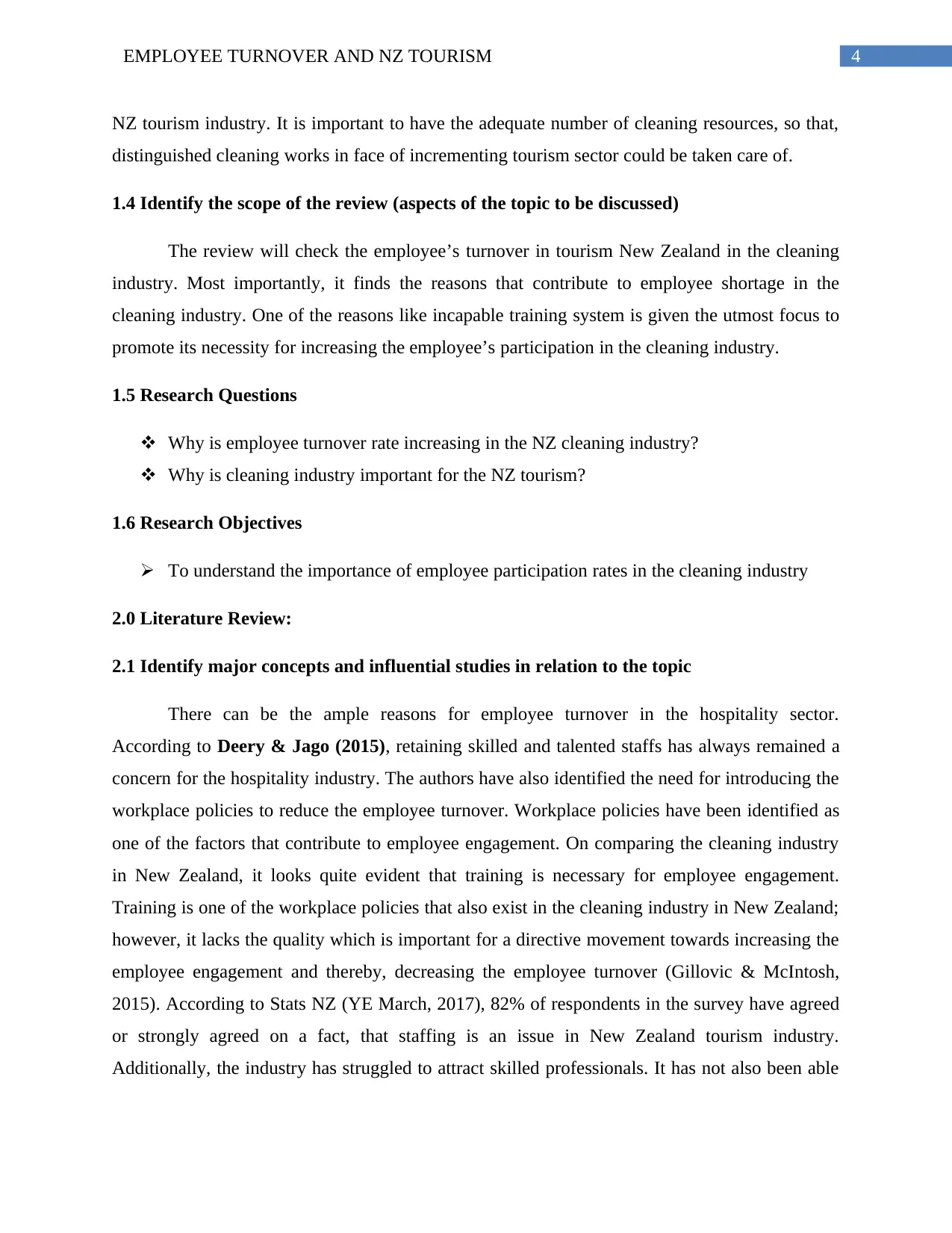
4EMPLOYEE TURNOVER AND NZ TOURISM
NZ tourism industry. It is important to have the adequate number of cleaning resources, so that,
distinguished cleaning works in face of incrementing tourism sector could be taken care of.
1.4 Identify the scope of the review (aspects of the topic to be discussed)
The review will check the employee’s turnover in tourism New Zealand in the cleaning
industry. Most importantly, it finds the reasons that contribute to employee shortage in the
cleaning industry. One of the reasons like incapable training system is given the utmost focus to
promote its necessity for increasing the employee’s participation in the cleaning industry.
1.5 Research Questions
Why is employee turnover rate increasing in the NZ cleaning industry?
Why is cleaning industry important for the NZ tourism?
1.6 Research Objectives
To understand the importance of employee participation rates in the cleaning industry
2.0 Literature Review:
2.1 Identify major concepts and influential studies in relation to the topic
There can be the ample reasons for employee turnover in the hospitality sector.
According to Deery & Jago (2015), retaining skilled and talented staffs has always remained a
concern for the hospitality industry. The authors have also identified the need for introducing the
workplace policies to reduce the employee turnover. Workplace policies have been identified as
one of the factors that contribute to employee engagement. On comparing the cleaning industry
in New Zealand, it looks quite evident that training is necessary for employee engagement.
Training is one of the workplace policies that also exist in the cleaning industry in New Zealand;
however, it lacks the quality which is important for a directive movement towards increasing the
employee engagement and thereby, decreasing the employee turnover (Gillovic & McIntosh,
2015). According to Stats NZ (YE March, 2017), 82% of respondents in the survey have agreed
or strongly agreed on a fact, that staffing is an issue in New Zealand tourism industry.
Additionally, the industry has struggled to attract skilled professionals. It has not also been able
NZ tourism industry. It is important to have the adequate number of cleaning resources, so that,
distinguished cleaning works in face of incrementing tourism sector could be taken care of.
1.4 Identify the scope of the review (aspects of the topic to be discussed)
The review will check the employee’s turnover in tourism New Zealand in the cleaning
industry. Most importantly, it finds the reasons that contribute to employee shortage in the
cleaning industry. One of the reasons like incapable training system is given the utmost focus to
promote its necessity for increasing the employee’s participation in the cleaning industry.
1.5 Research Questions
Why is employee turnover rate increasing in the NZ cleaning industry?
Why is cleaning industry important for the NZ tourism?
1.6 Research Objectives
To understand the importance of employee participation rates in the cleaning industry
2.0 Literature Review:
2.1 Identify major concepts and influential studies in relation to the topic
There can be the ample reasons for employee turnover in the hospitality sector.
According to Deery & Jago (2015), retaining skilled and talented staffs has always remained a
concern for the hospitality industry. The authors have also identified the need for introducing the
workplace policies to reduce the employee turnover. Workplace policies have been identified as
one of the factors that contribute to employee engagement. On comparing the cleaning industry
in New Zealand, it looks quite evident that training is necessary for employee engagement.
Training is one of the workplace policies that also exist in the cleaning industry in New Zealand;
however, it lacks the quality which is important for a directive movement towards increasing the
employee engagement and thereby, decreasing the employee turnover (Gillovic & McIntosh,
2015). According to Stats NZ (YE March, 2017), 82% of respondents in the survey have agreed
or strongly agreed on a fact, that staffing is an issue in New Zealand tourism industry.
Additionally, the industry has struggled to attract skilled professionals. It has not also been able
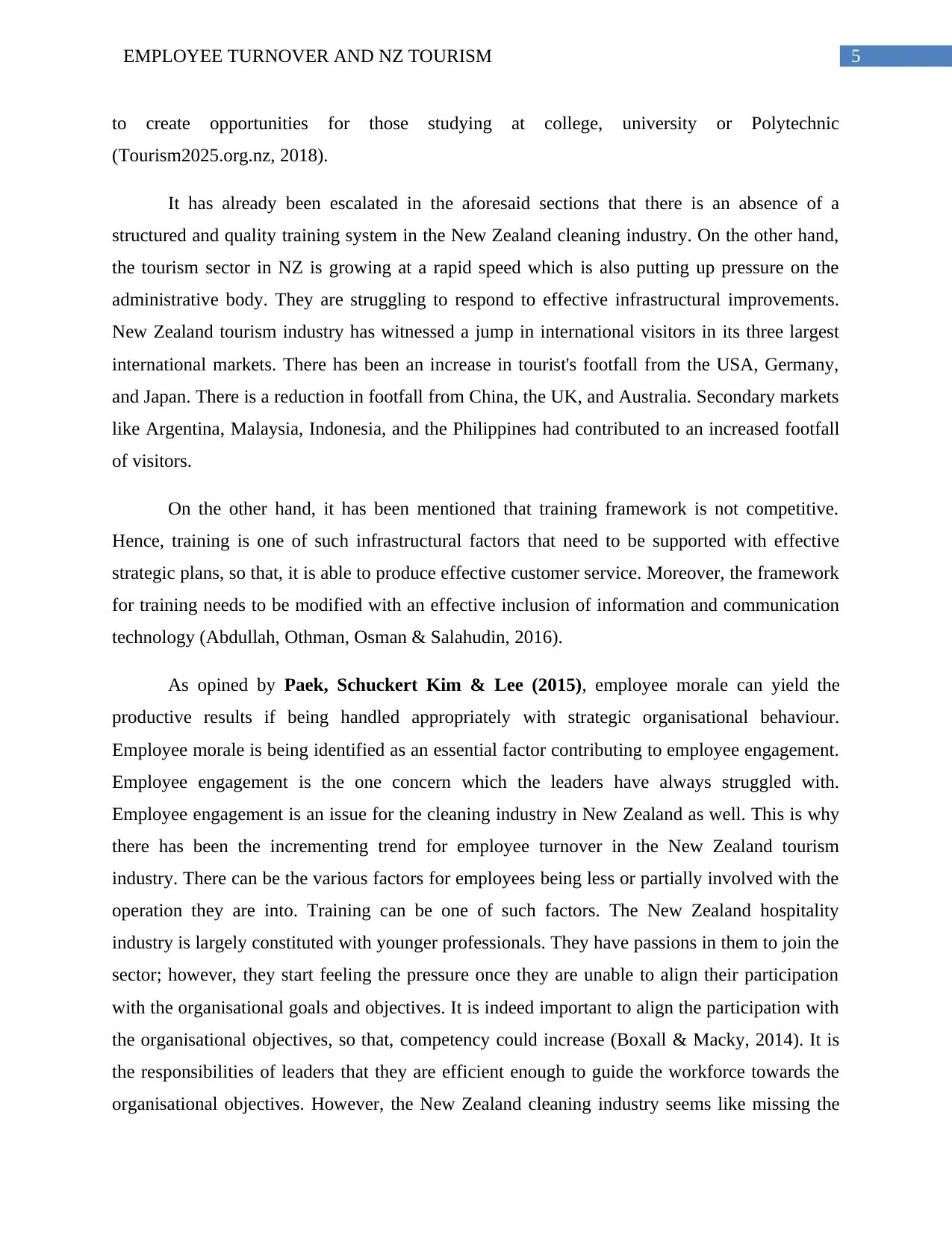
5EMPLOYEE TURNOVER AND NZ TOURISM
to create opportunities for those studying at college, university or Polytechnic
(Tourism2025.org.nz, 2018).
It has already been escalated in the aforesaid sections that there is an absence of a
structured and quality training system in the New Zealand cleaning industry. On the other hand,
the tourism sector in NZ is growing at a rapid speed which is also putting up pressure on the
administrative body. They are struggling to respond to effective infrastructural improvements.
New Zealand tourism industry has witnessed a jump in international visitors in its three largest
international markets. There has been an increase in tourist's footfall from the USA, Germany,
and Japan. There is a reduction in footfall from China, the UK, and Australia. Secondary markets
like Argentina, Malaysia, Indonesia, and the Philippines had contributed to an increased footfall
of visitors.
On the other hand, it has been mentioned that training framework is not competitive.
Hence, training is one of such infrastructural factors that need to be supported with effective
strategic plans, so that, it is able to produce effective customer service. Moreover, the framework
for training needs to be modified with an effective inclusion of information and communication
technology (Abdullah, Othman, Osman & Salahudin, 2016).
As opined by Paek, Schuckert Kim & Lee (2015), employee morale can yield the
productive results if being handled appropriately with strategic organisational behaviour.
Employee morale is being identified as an essential factor contributing to employee engagement.
Employee engagement is the one concern which the leaders have always struggled with.
Employee engagement is an issue for the cleaning industry in New Zealand as well. This is why
there has been the incrementing trend for employee turnover in the New Zealand tourism
industry. There can be the various factors for employees being less or partially involved with the
operation they are into. Training can be one of such factors. The New Zealand hospitality
industry is largely constituted with younger professionals. They have passions in them to join the
sector; however, they start feeling the pressure once they are unable to align their participation
with the organisational goals and objectives. It is indeed important to align the participation with
the organisational objectives, so that, competency could increase (Boxall & Macky, 2014). It is
the responsibilities of leaders that they are efficient enough to guide the workforce towards the
organisational objectives. However, the New Zealand cleaning industry seems like missing the
to create opportunities for those studying at college, university or Polytechnic
(Tourism2025.org.nz, 2018).
It has already been escalated in the aforesaid sections that there is an absence of a
structured and quality training system in the New Zealand cleaning industry. On the other hand,
the tourism sector in NZ is growing at a rapid speed which is also putting up pressure on the
administrative body. They are struggling to respond to effective infrastructural improvements.
New Zealand tourism industry has witnessed a jump in international visitors in its three largest
international markets. There has been an increase in tourist's footfall from the USA, Germany,
and Japan. There is a reduction in footfall from China, the UK, and Australia. Secondary markets
like Argentina, Malaysia, Indonesia, and the Philippines had contributed to an increased footfall
of visitors.
On the other hand, it has been mentioned that training framework is not competitive.
Hence, training is one of such infrastructural factors that need to be supported with effective
strategic plans, so that, it is able to produce effective customer service. Moreover, the framework
for training needs to be modified with an effective inclusion of information and communication
technology (Abdullah, Othman, Osman & Salahudin, 2016).
As opined by Paek, Schuckert Kim & Lee (2015), employee morale can yield the
productive results if being handled appropriately with strategic organisational behaviour.
Employee morale is being identified as an essential factor contributing to employee engagement.
Employee engagement is the one concern which the leaders have always struggled with.
Employee engagement is an issue for the cleaning industry in New Zealand as well. This is why
there has been the incrementing trend for employee turnover in the New Zealand tourism
industry. There can be the various factors for employees being less or partially involved with the
operation they are into. Training can be one of such factors. The New Zealand hospitality
industry is largely constituted with younger professionals. They have passions in them to join the
sector; however, they start feeling the pressure once they are unable to align their participation
with the organisational goals and objectives. It is indeed important to align the participation with
the organisational objectives, so that, competency could increase (Boxall & Macky, 2014). It is
the responsibilities of leaders that they are efficient enough to guide the workforce towards the
organisational objectives. However, the New Zealand cleaning industry seems like missing the
⊘ This is a preview!⊘
Do you want full access?
Subscribe today to unlock all pages.

Trusted by 1+ million students worldwide
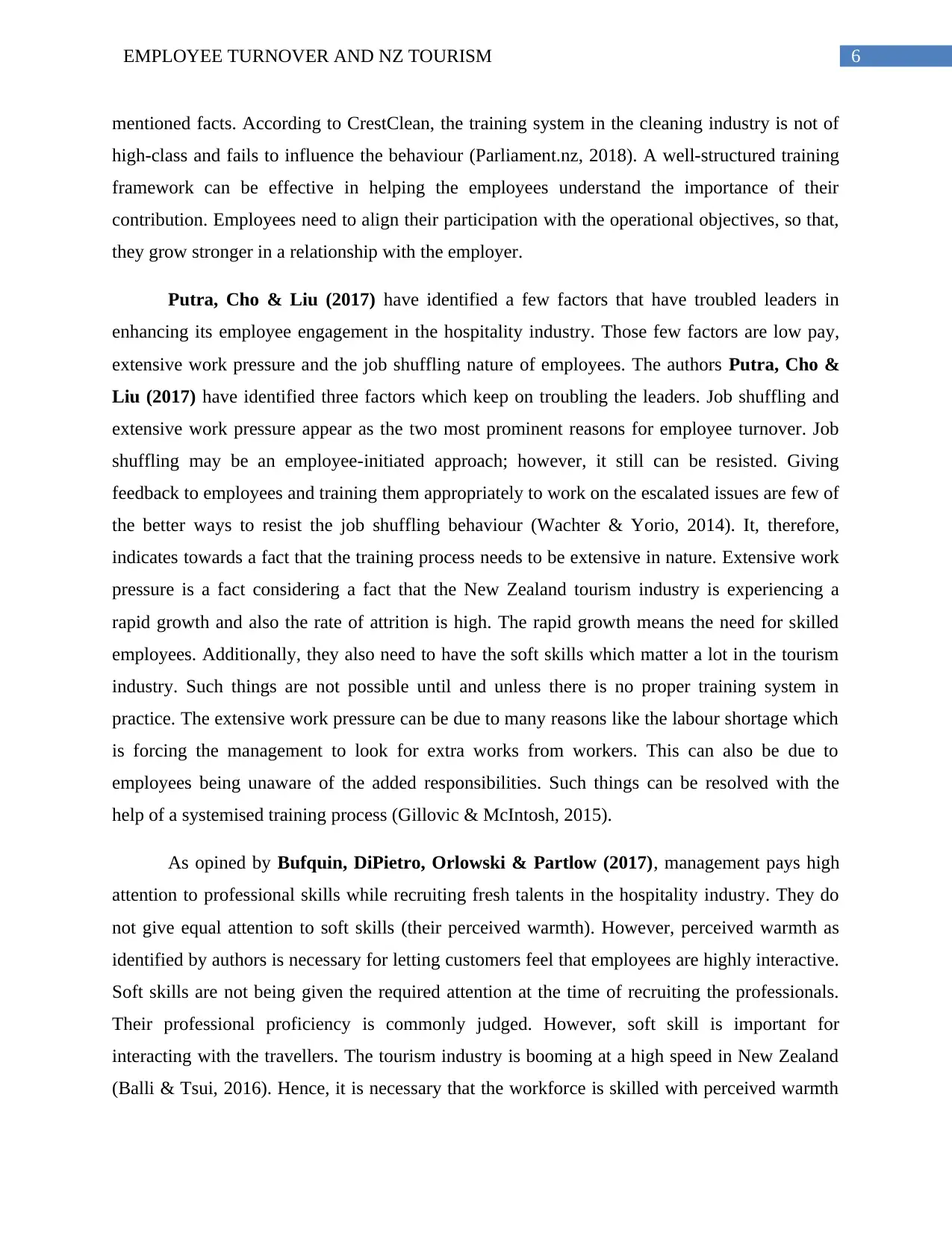
6EMPLOYEE TURNOVER AND NZ TOURISM
mentioned facts. According to CrestClean, the training system in the cleaning industry is not of
high-class and fails to influence the behaviour (Parliament.nz, 2018). A well-structured training
framework can be effective in helping the employees understand the importance of their
contribution. Employees need to align their participation with the operational objectives, so that,
they grow stronger in a relationship with the employer.
Putra, Cho & Liu (2017) have identified a few factors that have troubled leaders in
enhancing its employee engagement in the hospitality industry. Those few factors are low pay,
extensive work pressure and the job shuffling nature of employees. The authors Putra, Cho &
Liu (2017) have identified three factors which keep on troubling the leaders. Job shuffling and
extensive work pressure appear as the two most prominent reasons for employee turnover. Job
shuffling may be an employee-initiated approach; however, it still can be resisted. Giving
feedback to employees and training them appropriately to work on the escalated issues are few of
the better ways to resist the job shuffling behaviour (Wachter & Yorio, 2014). It, therefore,
indicates towards a fact that the training process needs to be extensive in nature. Extensive work
pressure is a fact considering a fact that the New Zealand tourism industry is experiencing a
rapid growth and also the rate of attrition is high. The rapid growth means the need for skilled
employees. Additionally, they also need to have the soft skills which matter a lot in the tourism
industry. Such things are not possible until and unless there is no proper training system in
practice. The extensive work pressure can be due to many reasons like the labour shortage which
is forcing the management to look for extra works from workers. This can also be due to
employees being unaware of the added responsibilities. Such things can be resolved with the
help of a systemised training process (Gillovic & McIntosh, 2015).
As opined by Bufquin, DiPietro, Orlowski & Partlow (2017), management pays high
attention to professional skills while recruiting fresh talents in the hospitality industry. They do
not give equal attention to soft skills (their perceived warmth). However, perceived warmth as
identified by authors is necessary for letting customers feel that employees are highly interactive.
Soft skills are not being given the required attention at the time of recruiting the professionals.
Their professional proficiency is commonly judged. However, soft skill is important for
interacting with the travellers. The tourism industry is booming at a high speed in New Zealand
(Balli & Tsui, 2016). Hence, it is necessary that the workforce is skilled with perceived warmth
mentioned facts. According to CrestClean, the training system in the cleaning industry is not of
high-class and fails to influence the behaviour (Parliament.nz, 2018). A well-structured training
framework can be effective in helping the employees understand the importance of their
contribution. Employees need to align their participation with the operational objectives, so that,
they grow stronger in a relationship with the employer.
Putra, Cho & Liu (2017) have identified a few factors that have troubled leaders in
enhancing its employee engagement in the hospitality industry. Those few factors are low pay,
extensive work pressure and the job shuffling nature of employees. The authors Putra, Cho &
Liu (2017) have identified three factors which keep on troubling the leaders. Job shuffling and
extensive work pressure appear as the two most prominent reasons for employee turnover. Job
shuffling may be an employee-initiated approach; however, it still can be resisted. Giving
feedback to employees and training them appropriately to work on the escalated issues are few of
the better ways to resist the job shuffling behaviour (Wachter & Yorio, 2014). It, therefore,
indicates towards a fact that the training process needs to be extensive in nature. Extensive work
pressure is a fact considering a fact that the New Zealand tourism industry is experiencing a
rapid growth and also the rate of attrition is high. The rapid growth means the need for skilled
employees. Additionally, they also need to have the soft skills which matter a lot in the tourism
industry. Such things are not possible until and unless there is no proper training system in
practice. The extensive work pressure can be due to many reasons like the labour shortage which
is forcing the management to look for extra works from workers. This can also be due to
employees being unaware of the added responsibilities. Such things can be resolved with the
help of a systemised training process (Gillovic & McIntosh, 2015).
As opined by Bufquin, DiPietro, Orlowski & Partlow (2017), management pays high
attention to professional skills while recruiting fresh talents in the hospitality industry. They do
not give equal attention to soft skills (their perceived warmth). However, perceived warmth as
identified by authors is necessary for letting customers feel that employees are highly interactive.
Soft skills are not being given the required attention at the time of recruiting the professionals.
Their professional proficiency is commonly judged. However, soft skill is important for
interacting with the travellers. The tourism industry is booming at a high speed in New Zealand
(Balli & Tsui, 2016). Hence, it is necessary that the workforce is skilled with perceived warmth
Paraphrase This Document
Need a fresh take? Get an instant paraphrase of this document with our AI Paraphraser
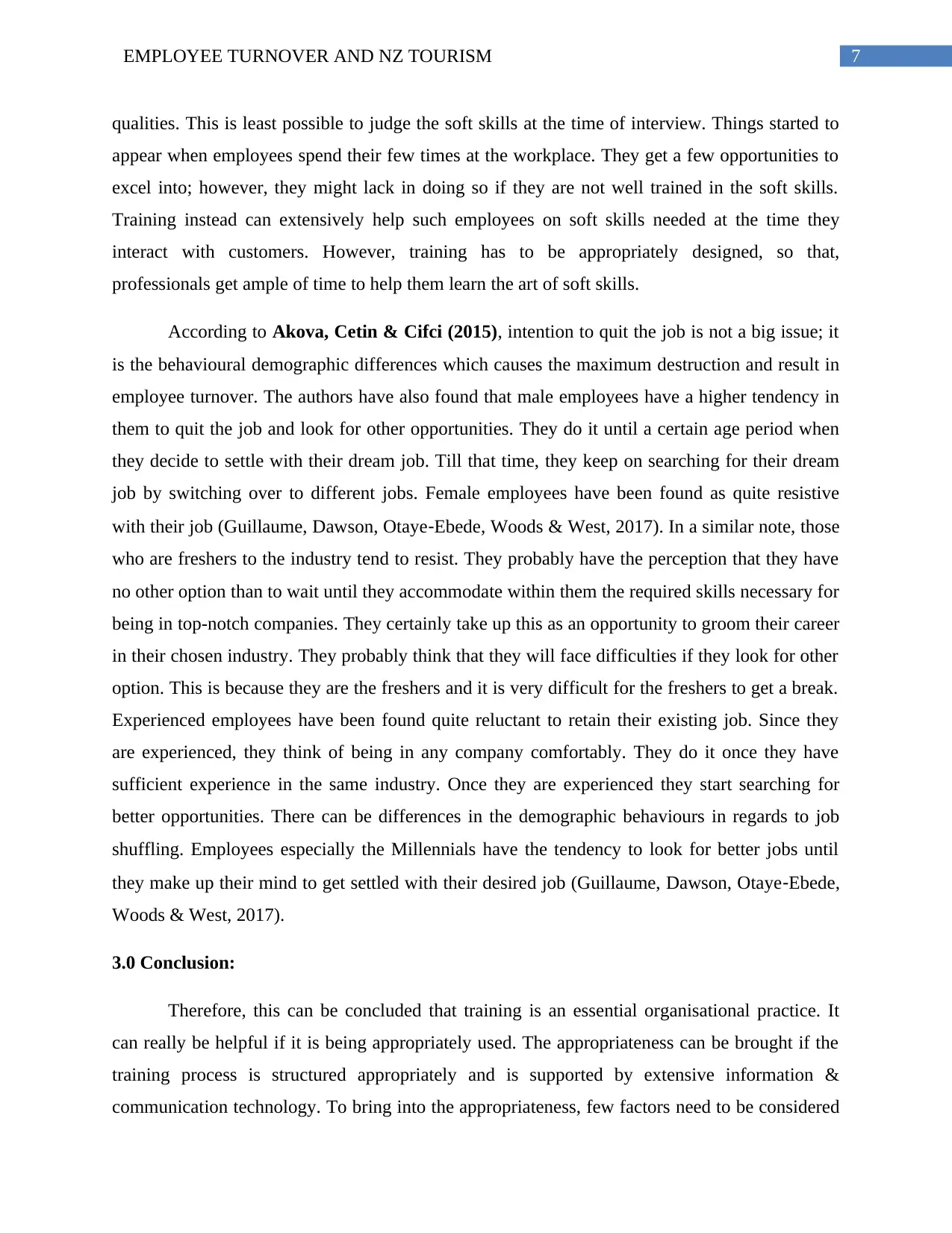
7EMPLOYEE TURNOVER AND NZ TOURISM
qualities. This is least possible to judge the soft skills at the time of interview. Things started to
appear when employees spend their few times at the workplace. They get a few opportunities to
excel into; however, they might lack in doing so if they are not well trained in the soft skills.
Training instead can extensively help such employees on soft skills needed at the time they
interact with customers. However, training has to be appropriately designed, so that,
professionals get ample of time to help them learn the art of soft skills.
According to Akova, Cetin & Cifci (2015), intention to quit the job is not a big issue; it
is the behavioural demographic differences which causes the maximum destruction and result in
employee turnover. The authors have also found that male employees have a higher tendency in
them to quit the job and look for other opportunities. They do it until a certain age period when
they decide to settle with their dream job. Till that time, they keep on searching for their dream
job by switching over to different jobs. Female employees have been found as quite resistive
with their job (Guillaume, Dawson, Otaye‐Ebede, Woods & West, 2017). In a similar note, those
who are freshers to the industry tend to resist. They probably have the perception that they have
no other option than to wait until they accommodate within them the required skills necessary for
being in top-notch companies. They certainly take up this as an opportunity to groom their career
in their chosen industry. They probably think that they will face difficulties if they look for other
option. This is because they are the freshers and it is very difficult for the freshers to get a break.
Experienced employees have been found quite reluctant to retain their existing job. Since they
are experienced, they think of being in any company comfortably. They do it once they have
sufficient experience in the same industry. Once they are experienced they start searching for
better opportunities. There can be differences in the demographic behaviours in regards to job
shuffling. Employees especially the Millennials have the tendency to look for better jobs until
they make up their mind to get settled with their desired job (Guillaume, Dawson, Otaye‐Ebede,
Woods & West, 2017).
3.0 Conclusion:
Therefore, this can be concluded that training is an essential organisational practice. It
can really be helpful if it is being appropriately used. The appropriateness can be brought if the
training process is structured appropriately and is supported by extensive information &
communication technology. To bring into the appropriateness, few factors need to be considered
qualities. This is least possible to judge the soft skills at the time of interview. Things started to
appear when employees spend their few times at the workplace. They get a few opportunities to
excel into; however, they might lack in doing so if they are not well trained in the soft skills.
Training instead can extensively help such employees on soft skills needed at the time they
interact with customers. However, training has to be appropriately designed, so that,
professionals get ample of time to help them learn the art of soft skills.
According to Akova, Cetin & Cifci (2015), intention to quit the job is not a big issue; it
is the behavioural demographic differences which causes the maximum destruction and result in
employee turnover. The authors have also found that male employees have a higher tendency in
them to quit the job and look for other opportunities. They do it until a certain age period when
they decide to settle with their dream job. Till that time, they keep on searching for their dream
job by switching over to different jobs. Female employees have been found as quite resistive
with their job (Guillaume, Dawson, Otaye‐Ebede, Woods & West, 2017). In a similar note, those
who are freshers to the industry tend to resist. They probably have the perception that they have
no other option than to wait until they accommodate within them the required skills necessary for
being in top-notch companies. They certainly take up this as an opportunity to groom their career
in their chosen industry. They probably think that they will face difficulties if they look for other
option. This is because they are the freshers and it is very difficult for the freshers to get a break.
Experienced employees have been found quite reluctant to retain their existing job. Since they
are experienced, they think of being in any company comfortably. They do it once they have
sufficient experience in the same industry. Once they are experienced they start searching for
better opportunities. There can be differences in the demographic behaviours in regards to job
shuffling. Employees especially the Millennials have the tendency to look for better jobs until
they make up their mind to get settled with their desired job (Guillaume, Dawson, Otaye‐Ebede,
Woods & West, 2017).
3.0 Conclusion:
Therefore, this can be concluded that training is an essential organisational practice. It
can really be helpful if it is being appropriately used. The appropriateness can be brought if the
training process is structured appropriately and is supported by extensive information &
communication technology. To bring into the appropriateness, few factors need to be considered
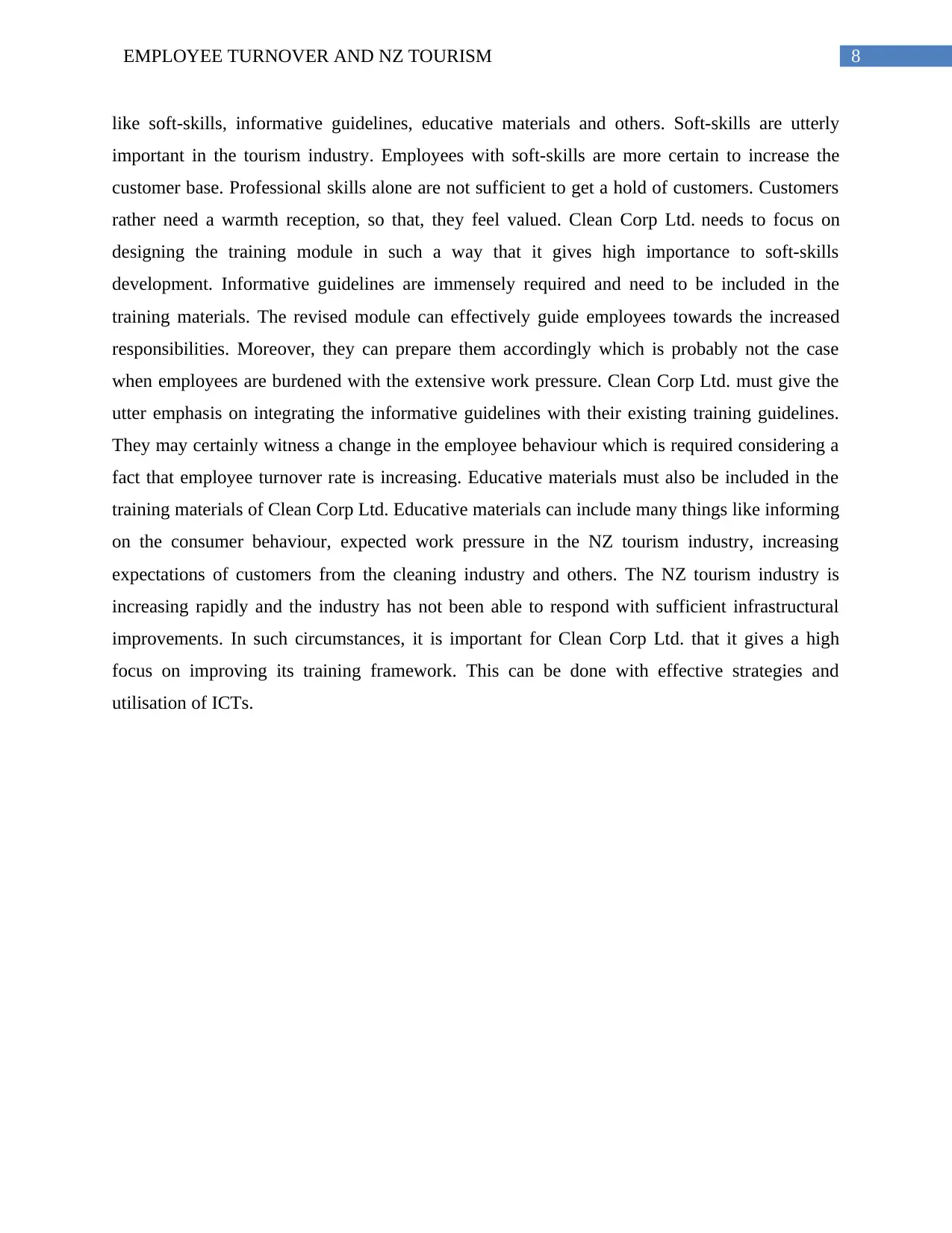
8EMPLOYEE TURNOVER AND NZ TOURISM
like soft-skills, informative guidelines, educative materials and others. Soft-skills are utterly
important in the tourism industry. Employees with soft-skills are more certain to increase the
customer base. Professional skills alone are not sufficient to get a hold of customers. Customers
rather need a warmth reception, so that, they feel valued. Clean Corp Ltd. needs to focus on
designing the training module in such a way that it gives high importance to soft-skills
development. Informative guidelines are immensely required and need to be included in the
training materials. The revised module can effectively guide employees towards the increased
responsibilities. Moreover, they can prepare them accordingly which is probably not the case
when employees are burdened with the extensive work pressure. Clean Corp Ltd. must give the
utter emphasis on integrating the informative guidelines with their existing training guidelines.
They may certainly witness a change in the employee behaviour which is required considering a
fact that employee turnover rate is increasing. Educative materials must also be included in the
training materials of Clean Corp Ltd. Educative materials can include many things like informing
on the consumer behaviour, expected work pressure in the NZ tourism industry, increasing
expectations of customers from the cleaning industry and others. The NZ tourism industry is
increasing rapidly and the industry has not been able to respond with sufficient infrastructural
improvements. In such circumstances, it is important for Clean Corp Ltd. that it gives a high
focus on improving its training framework. This can be done with effective strategies and
utilisation of ICTs.
like soft-skills, informative guidelines, educative materials and others. Soft-skills are utterly
important in the tourism industry. Employees with soft-skills are more certain to increase the
customer base. Professional skills alone are not sufficient to get a hold of customers. Customers
rather need a warmth reception, so that, they feel valued. Clean Corp Ltd. needs to focus on
designing the training module in such a way that it gives high importance to soft-skills
development. Informative guidelines are immensely required and need to be included in the
training materials. The revised module can effectively guide employees towards the increased
responsibilities. Moreover, they can prepare them accordingly which is probably not the case
when employees are burdened with the extensive work pressure. Clean Corp Ltd. must give the
utter emphasis on integrating the informative guidelines with their existing training guidelines.
They may certainly witness a change in the employee behaviour which is required considering a
fact that employee turnover rate is increasing. Educative materials must also be included in the
training materials of Clean Corp Ltd. Educative materials can include many things like informing
on the consumer behaviour, expected work pressure in the NZ tourism industry, increasing
expectations of customers from the cleaning industry and others. The NZ tourism industry is
increasing rapidly and the industry has not been able to respond with sufficient infrastructural
improvements. In such circumstances, it is important for Clean Corp Ltd. that it gives a high
focus on improving its training framework. This can be done with effective strategies and
utilisation of ICTs.
⊘ This is a preview!⊘
Do you want full access?
Subscribe today to unlock all pages.

Trusted by 1+ million students worldwide
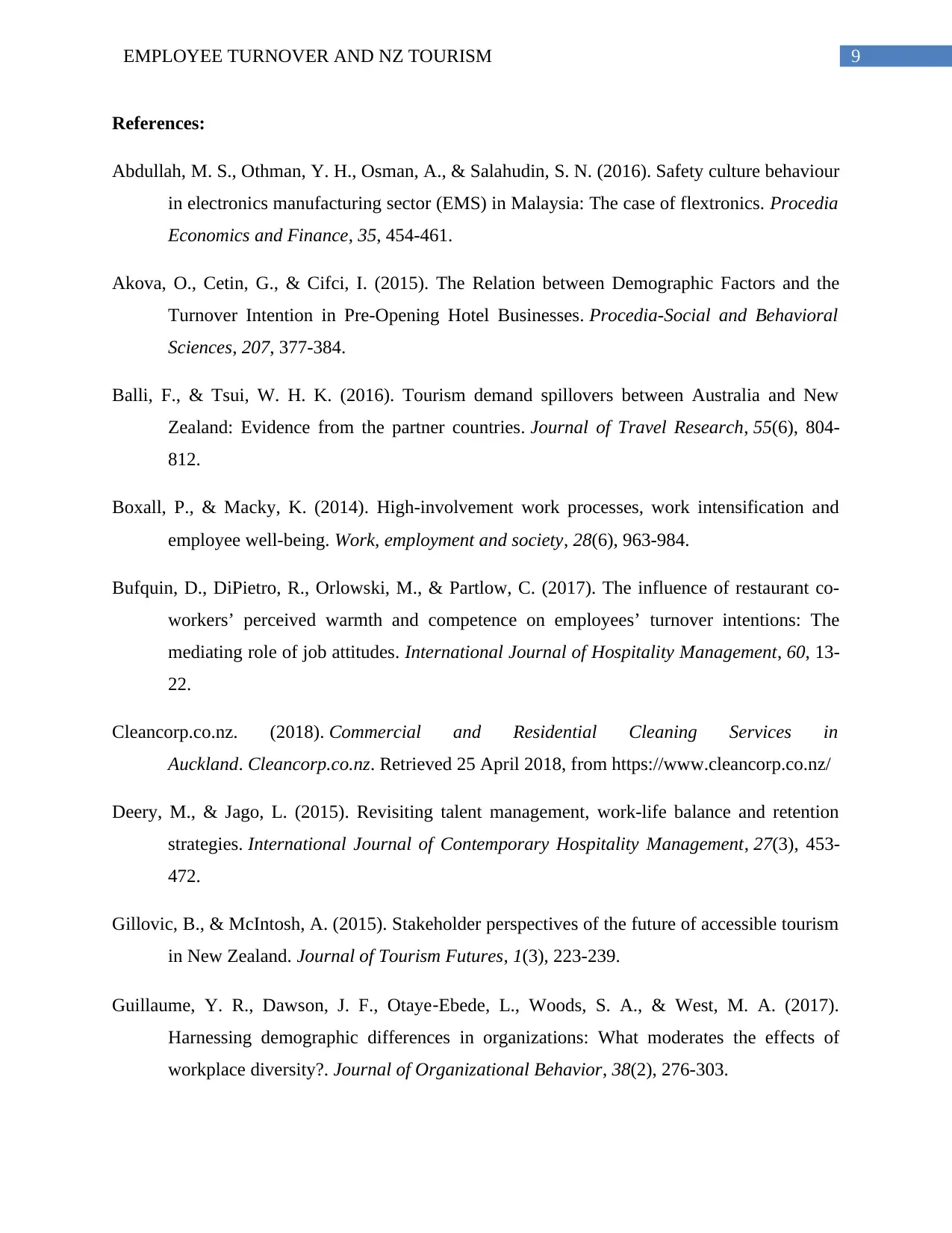
9EMPLOYEE TURNOVER AND NZ TOURISM
References:
Abdullah, M. S., Othman, Y. H., Osman, A., & Salahudin, S. N. (2016). Safety culture behaviour
in electronics manufacturing sector (EMS) in Malaysia: The case of flextronics. Procedia
Economics and Finance, 35, 454-461.
Akova, O., Cetin, G., & Cifci, I. (2015). The Relation between Demographic Factors and the
Turnover Intention in Pre-Opening Hotel Businesses. Procedia-Social and Behavioral
Sciences, 207, 377-384.
Balli, F., & Tsui, W. H. K. (2016). Tourism demand spillovers between Australia and New
Zealand: Evidence from the partner countries. Journal of Travel Research, 55(6), 804-
812.
Boxall, P., & Macky, K. (2014). High-involvement work processes, work intensification and
employee well-being. Work, employment and society, 28(6), 963-984.
Bufquin, D., DiPietro, R., Orlowski, M., & Partlow, C. (2017). The influence of restaurant co-
workers’ perceived warmth and competence on employees’ turnover intentions: The
mediating role of job attitudes. International Journal of Hospitality Management, 60, 13-
22.
Cleancorp.co.nz. (2018). Commercial and Residential Cleaning Services in
Auckland. Cleancorp.co.nz. Retrieved 25 April 2018, from https://www.cleancorp.co.nz/
Deery, M., & Jago, L. (2015). Revisiting talent management, work-life balance and retention
strategies. International Journal of Contemporary Hospitality Management, 27(3), 453-
472.
Gillovic, B., & McIntosh, A. (2015). Stakeholder perspectives of the future of accessible tourism
in New Zealand. Journal of Tourism Futures, 1(3), 223-239.
Guillaume, Y. R., Dawson, J. F., Otaye‐Ebede, L., Woods, S. A., & West, M. A. (2017).
Harnessing demographic differences in organizations: What moderates the effects of
workplace diversity?. Journal of Organizational Behavior, 38(2), 276-303.
References:
Abdullah, M. S., Othman, Y. H., Osman, A., & Salahudin, S. N. (2016). Safety culture behaviour
in electronics manufacturing sector (EMS) in Malaysia: The case of flextronics. Procedia
Economics and Finance, 35, 454-461.
Akova, O., Cetin, G., & Cifci, I. (2015). The Relation between Demographic Factors and the
Turnover Intention in Pre-Opening Hotel Businesses. Procedia-Social and Behavioral
Sciences, 207, 377-384.
Balli, F., & Tsui, W. H. K. (2016). Tourism demand spillovers between Australia and New
Zealand: Evidence from the partner countries. Journal of Travel Research, 55(6), 804-
812.
Boxall, P., & Macky, K. (2014). High-involvement work processes, work intensification and
employee well-being. Work, employment and society, 28(6), 963-984.
Bufquin, D., DiPietro, R., Orlowski, M., & Partlow, C. (2017). The influence of restaurant co-
workers’ perceived warmth and competence on employees’ turnover intentions: The
mediating role of job attitudes. International Journal of Hospitality Management, 60, 13-
22.
Cleancorp.co.nz. (2018). Commercial and Residential Cleaning Services in
Auckland. Cleancorp.co.nz. Retrieved 25 April 2018, from https://www.cleancorp.co.nz/
Deery, M., & Jago, L. (2015). Revisiting talent management, work-life balance and retention
strategies. International Journal of Contemporary Hospitality Management, 27(3), 453-
472.
Gillovic, B., & McIntosh, A. (2015). Stakeholder perspectives of the future of accessible tourism
in New Zealand. Journal of Tourism Futures, 1(3), 223-239.
Guillaume, Y. R., Dawson, J. F., Otaye‐Ebede, L., Woods, S. A., & West, M. A. (2017).
Harnessing demographic differences in organizations: What moderates the effects of
workplace diversity?. Journal of Organizational Behavior, 38(2), 276-303.
Paraphrase This Document
Need a fresh take? Get an instant paraphrase of this document with our AI Paraphraser
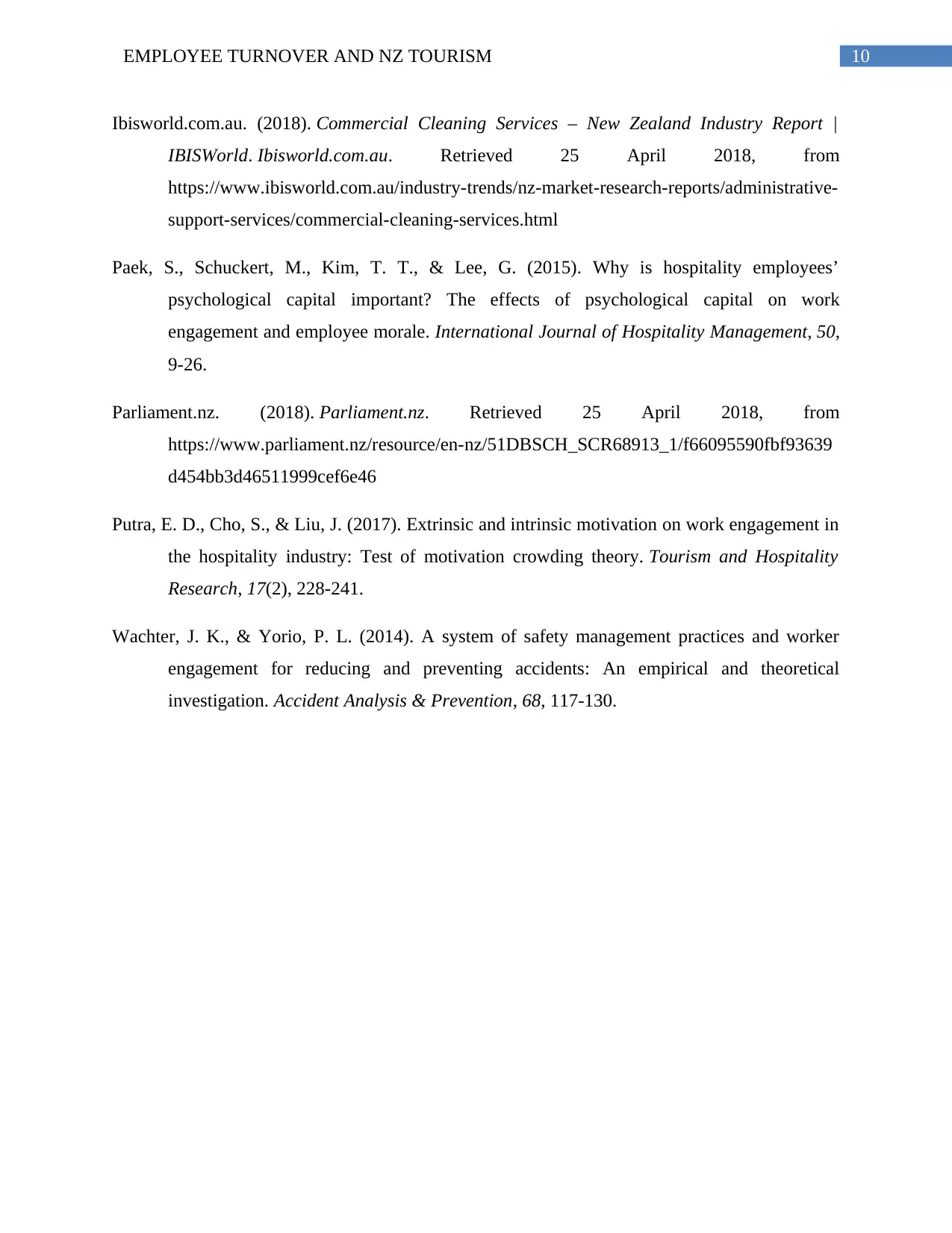
10EMPLOYEE TURNOVER AND NZ TOURISM
Ibisworld.com.au. (2018). Commercial Cleaning Services – New Zealand Industry Report |
IBISWorld. Ibisworld.com.au. Retrieved 25 April 2018, from
https://www.ibisworld.com.au/industry-trends/nz-market-research-reports/administrative-
support-services/commercial-cleaning-services.html
Paek, S., Schuckert, M., Kim, T. T., & Lee, G. (2015). Why is hospitality employees’
psychological capital important? The effects of psychological capital on work
engagement and employee morale. International Journal of Hospitality Management, 50,
9-26.
Parliament.nz. (2018). Parliament.nz. Retrieved 25 April 2018, from
https://www.parliament.nz/resource/en-nz/51DBSCH_SCR68913_1/f66095590fbf93639
d454bb3d46511999cef6e46
Putra, E. D., Cho, S., & Liu, J. (2017). Extrinsic and intrinsic motivation on work engagement in
the hospitality industry: Test of motivation crowding theory. Tourism and Hospitality
Research, 17(2), 228-241.
Wachter, J. K., & Yorio, P. L. (2014). A system of safety management practices and worker
engagement for reducing and preventing accidents: An empirical and theoretical
investigation. Accident Analysis & Prevention, 68, 117-130.
Ibisworld.com.au. (2018). Commercial Cleaning Services – New Zealand Industry Report |
IBISWorld. Ibisworld.com.au. Retrieved 25 April 2018, from
https://www.ibisworld.com.au/industry-trends/nz-market-research-reports/administrative-
support-services/commercial-cleaning-services.html
Paek, S., Schuckert, M., Kim, T. T., & Lee, G. (2015). Why is hospitality employees’
psychological capital important? The effects of psychological capital on work
engagement and employee morale. International Journal of Hospitality Management, 50,
9-26.
Parliament.nz. (2018). Parliament.nz. Retrieved 25 April 2018, from
https://www.parliament.nz/resource/en-nz/51DBSCH_SCR68913_1/f66095590fbf93639
d454bb3d46511999cef6e46
Putra, E. D., Cho, S., & Liu, J. (2017). Extrinsic and intrinsic motivation on work engagement in
the hospitality industry: Test of motivation crowding theory. Tourism and Hospitality
Research, 17(2), 228-241.
Wachter, J. K., & Yorio, P. L. (2014). A system of safety management practices and worker
engagement for reducing and preventing accidents: An empirical and theoretical
investigation. Accident Analysis & Prevention, 68, 117-130.
1 out of 11
Related Documents
Your All-in-One AI-Powered Toolkit for Academic Success.
+13062052269
info@desklib.com
Available 24*7 on WhatsApp / Email
![[object Object]](/_next/static/media/star-bottom.7253800d.svg)
Unlock your academic potential
Copyright © 2020–2026 A2Z Services. All Rights Reserved. Developed and managed by ZUCOL.



